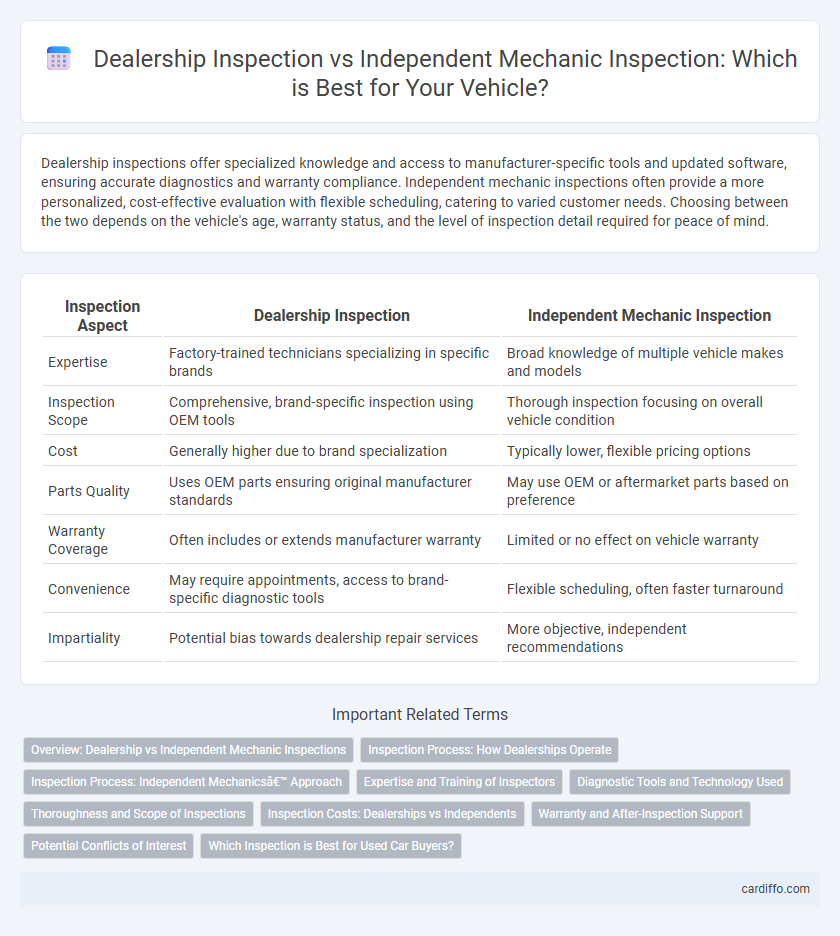Dealership inspections offer specialized knowledge and access to manufacturer-specific tools and updated software, ensuring accurate diagnostics and warranty compliance. Independent mechanic inspections often provide a more personalized, cost-effective evaluation with flexible scheduling, catering to varied customer needs. Choosing between the two depends on the vehicle's age, warranty status, and the level of inspection detail required for peace of mind.
Table of Comparison
| Inspection Aspect | Dealership Inspection | Independent Mechanic Inspection |
|---|---|---|
| Expertise | Factory-trained technicians specializing in specific brands | Broad knowledge of multiple vehicle makes and models |
| Inspection Scope | Comprehensive, brand-specific inspection using OEM tools | Thorough inspection focusing on overall vehicle condition |
| Cost | Generally higher due to brand specialization | Typically lower, flexible pricing options |
| Parts Quality | Uses OEM parts ensuring original manufacturer standards | May use OEM or aftermarket parts based on preference |
| Warranty Coverage | Often includes or extends manufacturer warranty | Limited or no effect on vehicle warranty |
| Convenience | May require appointments, access to brand-specific diagnostic tools | Flexible scheduling, often faster turnaround |
| Impartiality | Potential bias towards dealership repair services | More objective, independent recommendations |
Overview: Dealership vs Independent Mechanic Inspections
Dealership inspections typically offer specialized knowledge and access to manufacturer-specific diagnostic tools, ensuring a thorough evaluation aligned with brand standards. Independent mechanic inspections provide a broader range of expertise with competitive pricing, often tailoring services to individual customer needs. Both options vary in inspection scope, cost, and warranty considerations, influencing the overall vehicle assessment quality.
Inspection Process: How Dealerships Operate
Dealership inspections follow a standardized, manufacturer-approved checklist that ensures all vehicle components meet specific quality and safety standards, often using proprietary diagnostic tools. Technicians at dealerships receive specialized training directly from the car manufacturer, enabling them to detect model-specific issues more accurately during the inspection process. This approach contrasts with independent mechanics, who may use generalized equipment and processes, potentially leading to less comprehensive assessments.
Inspection Process: Independent Mechanics’ Approach
Independent mechanics conduct a thorough and unbiased inspection process, focusing on detailed diagnostics including engine performance, brake systems, and suspension components without dealership pressures. Their inspections often incorporate advanced scanning tools to identify hidden issues that may not be immediately apparent, ensuring a comprehensive evaluation. This approach prioritizes customer safety and cost-effective repairs by highlighting necessary maintenance rather than upselling additional dealership services.
Expertise and Training of Inspectors
Dealership inspections are conducted by technicians who receive specialized training and certification specific to the vehicle brand, ensuring in-depth knowledge of manufacturer standards and updates. Independent mechanics often possess broad expertise across multiple vehicle makes, supported by certifications such as ASE, enabling versatile diagnostic skills. The dealership's brand-focused training provides precise expertise, while independent mechanics offer a wide-ranging perspective on vehicle issues.
Diagnostic Tools and Technology Used
Dealership inspections utilize manufacturer-specific diagnostic tools and advanced technology, ensuring compatibility with the latest vehicle software and systems for precise issue detection. Independent mechanics often use multi-brand diagnostic scanners and general tools, which may lack the proprietary updates found in dealership equipment but offer flexibility across various vehicle models. Access to dealership-level technology enables more accurate fault codes reading and software updates, critical for modern vehicle maintenance and repair.
Thoroughness and Scope of Inspections
Dealership inspections typically offer a more thorough and comprehensive scope, covering manufacturer-specific systems, software updates, and warranty protections with specialized diagnostic tools. Independent mechanic inspections often provide flexibility and personalized attention but may lack access to proprietary technology, potentially limiting the depth of the inspection. Choosing between the two depends on the importance of detailed manufacturer compliance versus cost-effective and customizable service options.
Inspection Costs: Dealerships vs Independents
Inspection costs at dealerships typically run higher due to brand-specific expertise and the use of OEM parts, often ranging from $100 to $200 per visit. Independent mechanics offer more competitive pricing, commonly charging between $70 and $130 for similar inspection services, leveraging lower overhead and more flexible parts sourcing. Consumers balancing cost and quality often weigh dealership brand specialization against independent mechanics' affordability and personalized service.
Warranty and After-Inspection Support
Dealership inspections often include warranty-covered repairs and manufacturer-trained technicians who ensure compliance with specific service protocols, providing seamless after-inspection support through authorized parts and service networks. Independent mechanic inspections typically offer flexibility, potentially lower costs, and personalized service but may lack direct access to warranty-covered repairs or manufacturer-backed guarantees, affecting after-inspection support options. Evaluating warranty status and post-inspection service availability is crucial when choosing between dealership and independent mechanic inspections to ensure comprehensive vehicle care and protection.
Potential Conflicts of Interest
Dealership inspections often prioritize manufacturer-specific standards and may overlook some issues to maintain brand reputation, leading to potential conflicts of interest. Independent mechanic inspections provide unbiased assessments because they operate without direct affiliations, ensuring more comprehensive evaluations. Consumers benefit from comparing both to avoid biased reports and make informed decisions about vehicle condition.
Which Inspection is Best for Used Car Buyers?
Dealership inspections typically offer comprehensive vehicle history reports and certified mechanic evaluations, ensuring alignment with manufacturer standards. Independent mechanic inspections provide unbiased, detailed assessments that may uncover hidden issues overlooked by dealerships tied to sales incentives. For used car buyers, combining both inspections can maximize confidence in purchase decisions by leveraging dealership certification and independent thoroughness.
Dealership inspection vs independent mechanic inspection Infographic

 cardiffo.com
cardiffo.com